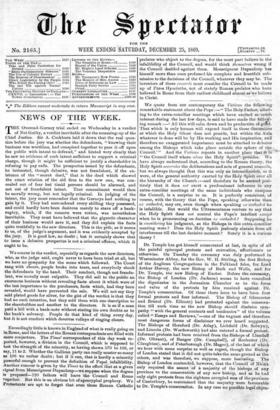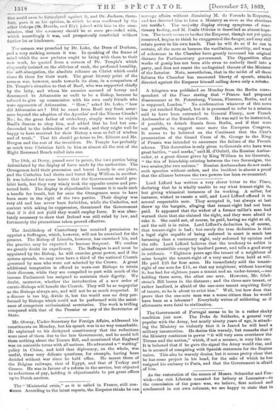Dr. Temple has got himself consecrated at last, in spite
of all the painful episcopal protests and entreaties, affectionate or otherwise. On Tuesday the ceremony was duly performed in Westminster Abbey, for the Rev. IV. H. Stirling, the first Bishop of the Anglican Congregations in the Falkland Isles, for Lord Arthur Hervey, the new Bishop of Bath and Wells, and for Dr. Temple, the new Bishop of Exeter. Before the ceremony, the Bishop of London (Dr. Jackson) seems to have consulted the dignitaries in the Jerusalem Chamber as to the force and value of the protests by him received against Dr. Temple's consecration. Of these there Teem to have been four formal protests and four informal. The Bishop of Gloucester and Bristol (Dr. Ellicott) had protested against the consecra- tion till such time as the new Bishop should disclaim sym- pathy "with the general contents and tendencies" of the volume called " Essays and Reviews,"—one of the vaguest and therefore most dangerous forms of disclaimer we ever heard suggested. The Bishops of Hereford (Dr. Atlay), Lichfield (Dr. Selwyn), and Lincoln (Dr. Wordsworth) had also entered a formal protest. Informal protests had been received from the Bishops of Llandaff (Dr. Olivant), of Bangor (Dr. Campbell), of Rochester (Dr. Claughton), and of Peterborough (Dr. Magee), of the last of which we hear with some surprise as well as regret, though the Bishop of London stated that it did not quite take the same ground as the others, and was therefore, we suppose, more hesitating. The Bishop of London contended, however, that the Connell of NiCmi only required the assent 'of a majority of the bishops of any province to the consecration of any new bishop, and as he had only eight protests from the eighteen occupied sees of the province of Canterbury, he maintained that the majority were favourable to Dr. Temple's consecration. In any case no possible legal objee-
tion could even be formulated against it, and Dr. Jackson, there- fore, gave it as his opinion, in which he was confirmed by the other bishops (St. Davids, and Ely) joinel with him in the com- mission, that the ceremony should be at once proceeded with, which accordingly it was, and prosperously concluded without further let or hindrance.



































 Previous page
Previous page